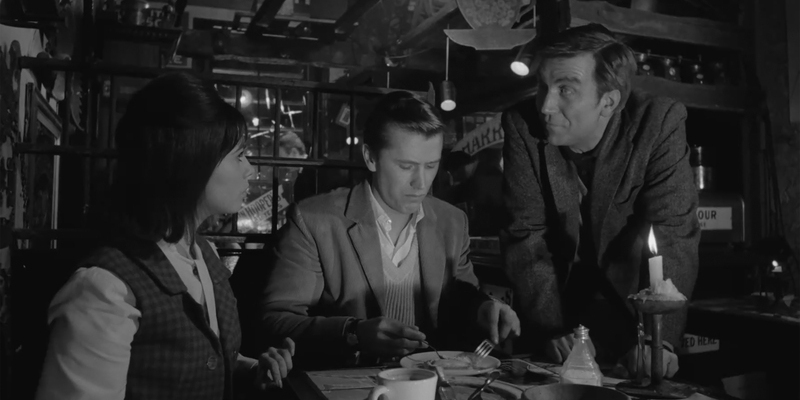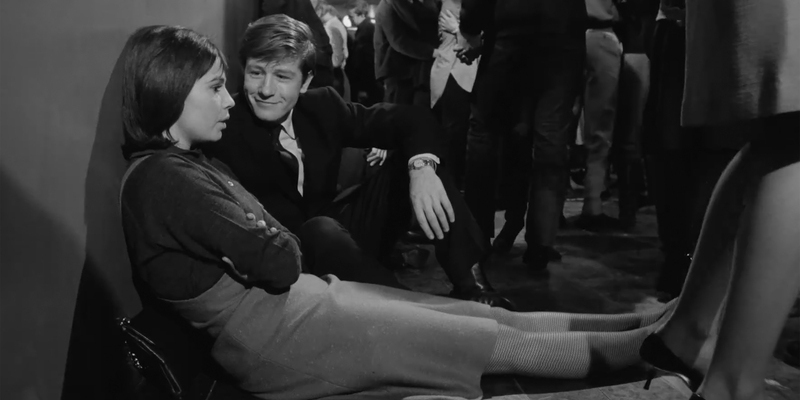
Review by
Eric Hillis
Directed by: Michael Winner
Starring: Alfred Lynch, Kathleen Breck, Eric Portman, Diana Dors, Kathleen
Harrison

The late Michael Winner would probably have been the first to admit
he was a journeyman hack, but in the mid 1960s he threatened to break into
the ranks of the British New Wave with a handful of semi-respectable
social realist dramas.
After a string of b-movies, usually with "Cool" in the title (Some Like it Cool, Play it Cool, The Cool Mikado), Winner received a significant break when Joseph Losey walked away from
directing an adaptation of Laura Del-Rivo's novel 'The Furnished
Room'. Winner was chosen by the producers likely because he was a fast,
efficient worker, but he turned in a movie that captures
pre-Beatles/Stones England with as much verisimilitude as Richardson,
Reisz or Schlesinger.

West 11 drops us into Notting Hill in 1963, a landscape of
Regency houses divided up into shoddy bedsits, whose tenants spend their
evenings in jazz clubs and cafés to stay warm and avoid the rodents. Joe
Beckett (Alfred Lynch) is one such denizen of the borough, a
listless young man drifting through life in search of something to shake
him out of his existential malaise.
Fired for insubordination from his job at a tailor's, Beckett is
approached by Richard Dyce (Eric Portman), a shady ex-army officer
who claims to like the cut of Beckett's jib. Dyce tries to convince the
young man to murder Dyce's rich aunt for her inheritance, which he'll
split with Beckett, who turns down his proposal immediately. But as he
drifts through a grey and dreary '60s London that hasn't begun to swing
just yet, Beckett begins to give some thought to the idea.

Beckett isn't so much an angry young man as an apathetic one. Nothing
seems to phase him, from losing his girlfriend (Kathleen Breck) and
his job to being kicked out of his crummy lodgings. He seems resigned to
his fate, yet can't see that his troubles are of his own making. At this
time, authors like Del-Rivo and Colin Wilson were pushing a pretentious
form of libertarianism, drawing heavily from Aleister Crowley's "Do what
thou will shall be the whole of the law" creed. There's a narcissism to
Beckett's self-pity, which causes as much trouble for those around him as
for himself. So filled with self-loathing is Beckett that it's difficult
to care about which turn he takes at the moral crossroads he faces, and
the film certainly doesn't care about his potential victim. Many viewers
may even be rooting for Beckett to get his comeuppance by the end.
I've always felt that if you want to get a true picture of a time and
place, don’t watch movies made by auteurs in that time and place but
rather those made by journeymen. The auteur will paint a picture through
their own lens, while the journeyman will simply capture what's in front
of them. That's the case with West 11, which sees Winner capture a warts and all presentation of Notting Hill,
then the sort of slum Richard Curtis wouldn't dream of setting a rom-com
in. Winner's camera follows Beckett through bedsits reeking of damp, down
to basement jazz clubs, past fascist rallies and wrecking balls finishing
the job the Luftwaffe started on London two decades earlier. It's hard to
believe that in a matter of months this glum Northern European metropolis
would become the pop culture capital of the world for the rest of the
decade, and it's even harder to picture men like Beckett turning on and
tuning out. But then, I guess the drugs might have helped.

It's fitting that Beckett has an encounter with a young thug played by
David Hemmings - who would later embody swinging sixties London as
the photographer anti-hero of that ultimate time capsule of the period,
Antonioni's Blow-Up – as it feels like a scuffle between
young London's present and future. Beckett wins this bout, but it's a war
he'll ultimately lose.
Perhaps what's most interesting about West 11 is the tug of
war between Dyce and Beckett. The former is clinging to past glories of
WWII, even if you get the sense his war record is 90% bluster, while the
latter is desperate for something new to arrive. Beckett is about to get
his wish, but in this post-war Britain neither men can find a footing.
Dyce mourns the fact that the next war will likely be fought with nuclear
weapons, denying young men the experiences of comradeship he believes
shaped him. Beckett seems quite happy for the bomb to fall right on his
head and put him out of his misery. Anyone expecting a gripping thriller
might want to be put out of their own misery while watching the
dreary West 11, but those who can appreciate it as a document of a forgotten period of
London history while find value in Winner's film.

West 11 is on UK blu-ray, DVD and
digital from July 5th.
